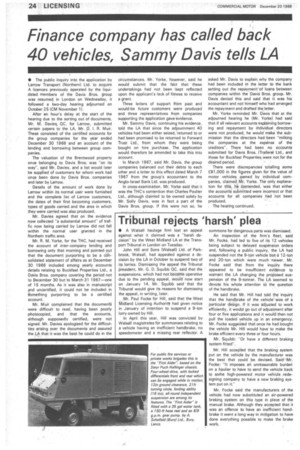Tribunal rejects 'harsh' plea
Page 26

If you've noticed an error in this article please click here to report it so we can fix it.
• A Walsall haulage firm lost an appeal against what it claimed was a "harsh decision" by the West Midland LA at the Transport Tribunal in London on Tuesday.
John Hill and Sons (Walsall) Ltd. of Parkbrook, Walsall, had appealed against a decision by the LA in October to suspend two of its lorries. Dismissing the appeal the Tribunal president, Mr. G. D. Squibb QC, said that the suspensions, which had not become operative due to the pending appeal, would now start on January 14. Mr. Squibb said that the Tribunal would give its reasons for dismissing the appeal, in writing, later.
Mr. Paul Focke for Hill, said that the West Midland Licensing Authority had given notice in January of intention to suspend a 9-ton lorry owned by Hill.
In April this year, Hill Was convicted by Walsall magistrates for summonses relating to a vehicle having an inefficient handbrake, no speedometer and a missing rear reflector, A summons for dangerous parts was dismissed.
An inspection of the firm's fleet, said Mr. Focke, had led to five of its 12 vehicles being subject to delayed suspension Orders and, following a public inquiry, the LA had suspended not the 9-ton vehicle bUt.a 12-ton and 20-ton which were much newer. Mr. Focke said that from the inquiry there appeared to be insufficient evidence to warrant the LA changing the proposed suspension of the 9-tonner. The LA seemed to devote his whole attention t6 the question of the handbrake.
He said that Mr. Hill had told the inquiry that the handbrake of the vehicle was of a particular design. If it was adjusted to work efficiently, it woUld go out of adjustment after four or five applications and it would then not pull the loaded vehicle up in an emergency, Mr. Focke suggested that once he had bought the vehicle Mr. Hill would have to make the brake efficient every three or four hours.
Mr. Squibb: "Or have a different braking system fitted".
Mr. Hill accepted that the braking system put on the vehicle by the manufacturer was the best that could be devised. Said. Mr. Focke: "It imposes ah unreasonable burden on a haulier to have to send the vehicle back to some high-powered motor vehicle •redesigning company to have a new braking system put on it."
Mr. Focke said the manufacturers of the vehicle had now substituted an air-powered braking system on this type in place of the manual brake. Although they accepted that it was an offence to have an inefficient handbrake it went a long way in mitigation to have done everything possible to make the brake work.


























































































